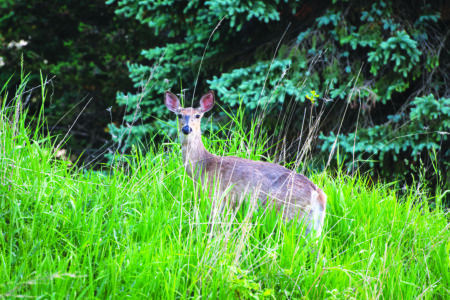KISMA will pay for your invasive plants

The Keweenaw Invasive Species Management Area, or KISMA, is offering a new incentive.
On Aug. 3, 8 and 10 participants can turn in their barberry plants, roots and all, at various locations in the area (full schedule below). In exchange for the invasive ornamental plants, KISMA will be giving out $10 coupons for a non-invasive alternative from any nursery participating in the Go Beyond Beauty program. Visit mtu.edu/kisma to RSVP and guarantee your $10 coupon.
Barberry, officially Japanese barberry, is an invasive species often sold as an ornamental garden plant. It can easily spread to native areas and harm healthy habitats. The plants also attract ticks and other pests that can spread diseases to humans.
KISMA’s website explains that many invasive plants in local areas are bought for ornamental reasons.
“We believe it is possible to create spaces that transcend beauty alone,” KISMA says. “You can prevent the introduction and spread of invasive species by purchasing plants at local nurseries and through landscapers or designers that have committed to not selling high-threat invasive ornamental plants in Michigan.”
A few of these providers include Flowers by Sleeman in Houghton, Kismet Gardens in Baraga and Designs by Nature in Marquette. Coupons can be redeemed at these locations.
KISMA also offers a few alternatives to the invasive Japanese Barberry. Ninebark is tolerant of a variety of soils and light availability. It is beautiful when pruned or left to grow wild. Ninebark supports birds and pollinators and has clusters of white flowers.
New Jersey tea does well in the sun and dry, sandy soils. Similar to Ninebark, it has white flowers that can attract pollinators and even hummingbirds. It keeps a nice, round shape without too much maintenance, and so would be a good fit for those of us who sometimes forget we have to water and prune our plants.
Fragrant sumac grows low and can cover a large area of ground without getting completely out of control. This plant often attracts butterflies and does well in wet soils. It has a beautiful color variety, turning reddish in summer and a deep maroon in winter.
More information is available at mtu.edu/kisma, and questions can be directed to kisma.up@gmail.com.
KISMA PLANT COLLECTION SCHEDULE
August 3, 10 a.m.-2 p.m. @ Houghton High School Parking Lot
August 8, 4-7 p.m. @ L’Anse Department of Public Works
August 10, 10 a.m.- 2p.m. @ Eagle Harbor Solid Waste Facility






